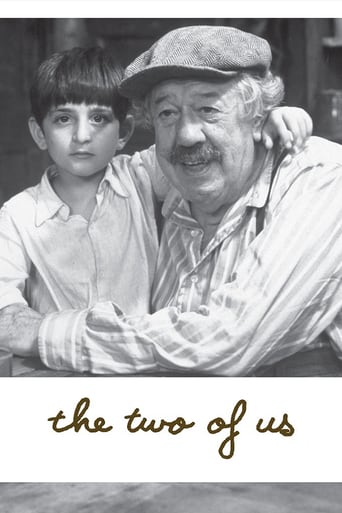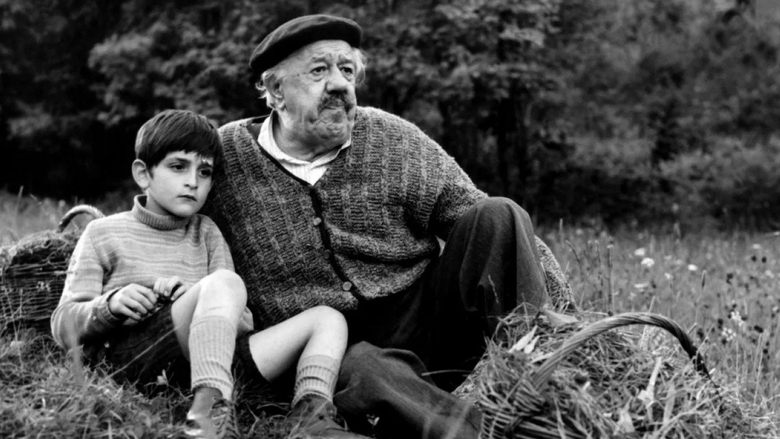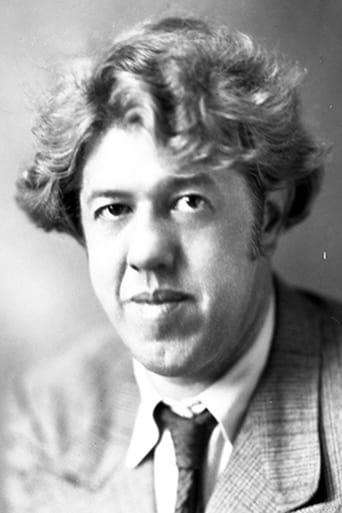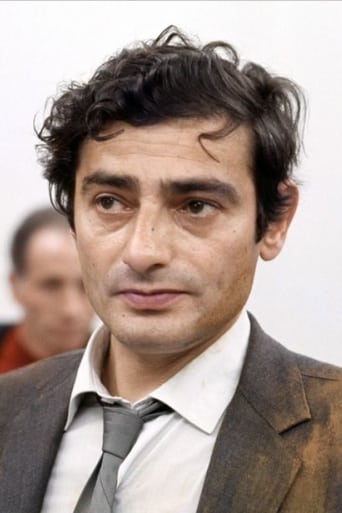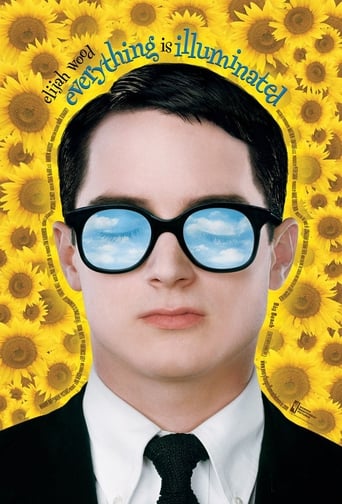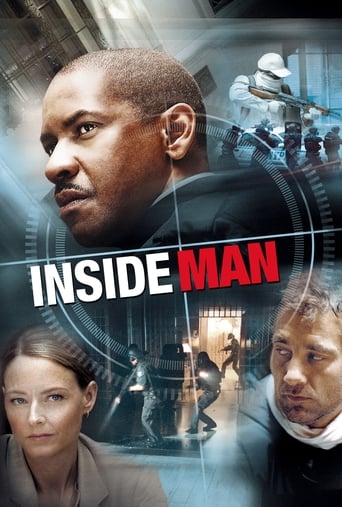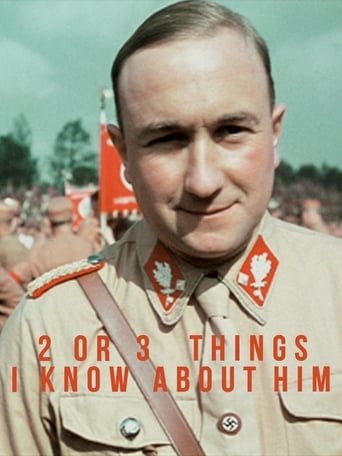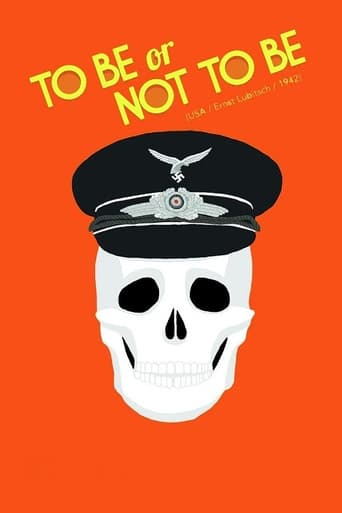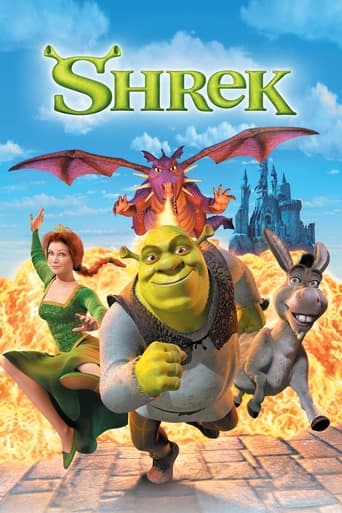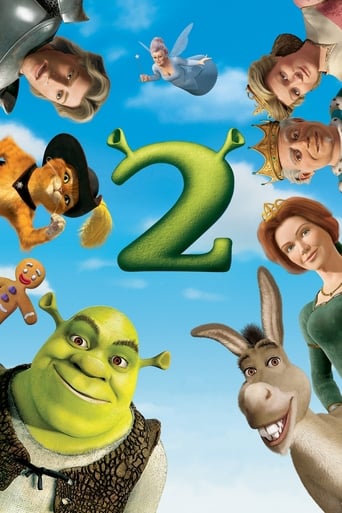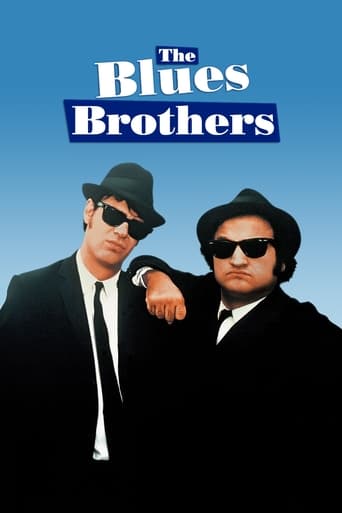The Two of Us (1967)
A story of the caring friendship formed between a crusty, old anti-Semite and an eight-year-old Jewish boy who goes to live with him during World War II.
Watch Trailer
Free Trial Channels
Cast


Similar titles
Reviews
terrible... so disappointed.
Better Late Then Never
I wanted to like it more than I actually did... But much of the humor totally escaped me and I walked out only mildly impressed.
One of the worst ways to make a cult movie is to set out to make a cult movie.
Claude Berri's The Two of Us (1967) proves two critical axioms. (i) A period film is as much about the time it is made as the time it is set. Why else tell it now? The very best are also about the time they're seen, even decades later. They tap into a continuing, profound truth that transcends the original incident. (ii) The most effective treatment of a large theme is a small, intimate story. Then an issue gets an emotional address in human terms, not abstractions.(i) In 1967 Claude Berri described the loving relationship that develops around 1944 between an 8-year-old Jewish boy -- sent for refuge from occupied Paris to the countryside -- and Pepe, the antisemitic old man who hosts him. Pepe becomes the boy's Gramps. As the old Petainiste spouts the clichés of French antisemitism he personifies a tradition that extends from the Dreyfuss Affair to the Nazi collaborators — and down to today, the recent slaughters in Paris and the government's detachment from Israel. As Berri taps a deep and resurgent vein in French culture his film feels as current now as it did in 1967.(ii) This small humorous story illuminates the global tragedy of antisemitism, as large a topic as one can undertake. Little Victor is a charming miniature of The Jew. He's bright enough to trounce the old man's adult son at checkers — consistently. He's disciplined enough to hide his Jewishness (his circumcision as well as his name) from the country folk. His attempts to fit in — courting a neighbour's blonde daughter — end in his humiliation. A city schoolmate calls him a dirty Jew. The rural kids don't know he's Jewish but bully him anyway, for no reason other than they consider him an outsider. That's the basis of the Jew's perpetual persecution. But Victor also has the Jew's indomitable spirit. In the city he gets into trouble by refusing to accept the inhibitions his frightened parents feel and try to impose. He won't be intimidated or suppressed. He impishly probes old Pepe's prejudice, urging him to spout the stereotype then charging the old man with the very qualities he declared Jewish. He calculates how to get to share the old couple's bed the way he did his parents'.The ending is poignant. After Liberation Pepe feels "the world has passed me by." His beloved Petain is defeated and the nations he considers France's enemies have won the war. His dear old dog has died, his son has turned against his politics and his authority, and now he loses the lad he has come to love. Pepe and his wife stand in the rain as the bus taking away Victor and his parents drives off, their faces against the back window. Pepe doesn't have to reconsider his antisemitism in the light of his love for Victor. We know the boy loved him, despite that prejudice. He felt the old man's love despite his words. Pepe has an emotional connection truer than the bigoted myth he believed.The film has a nostalgic feel, confirmed by the fact Director Berri gives young Victor his own family name: Langmann. The English title seems an improvement on the French original. "The Old Man and the Boy" suggests an outside perspective on the pair. "The Two of Us" speaks from within the two -- for either one. The English title emphasizes the connection, the French their difference. Sad to say, recent events suggest the world has not passed the old bigot by after all.
Claude Berri has been gracing French cinema as Producer, Writer, Actor and Director for several years and it's a given that at least two or three of his movies are on every discerning viewer's 'Best' list and I don't necessarily mean the obvious, i.e. Jean de Florette and its other half Manon but things like Lucie Aubrac which is also set in Occupied France as is this gem. The idea of teaming a Senior Citizen with a child is far from new and far from played out, witness Papillon less than a decade ago, but it is, by definition, tricky and the trick is in finding a suitable child. Berri struck oil with Alain Cohen and all he had to do was pair him with Michel Simon and the movie practically made itself. That, of course, is the impression an audience gets when a master filmmaker like Berri is on bullhorn. I can add little to the praise, merely second it. A great movie.
This tale of a young Jewish boy sent into the French country side to avoid the possibility/likelihood of a round up of Jews by the Vichy Government parallels Claude Berri's personal experience, I believe. It says at the very beginning of the film that it is an experience seen in retrospect from the vantage point of the child. So, while it is sentimentalized as another commenter wrote on this site, that's what one might expect from a grown up looking back at the adventures of his eight or nine year old self. This is definitely NOT a straight forward narrative from an uninvolved scriptwriter/director. The "Grandfather" with whom the child is lodged hates Jews. He claims to be able to recognize them by their smell, their hooked noses, etc. The role of the Grandfather is brilliantly executed by Michel Simon. Filmed in the sixties in black and white, it still appears occasionally at Jewish film festivals under the title "The Two of Us." While you may despise the Grandfather's bigotry, he's also portrayed as loving toward the boy and lovable. The connection between the Grandfather and the boy, portrayed by Alain Cohen, is actually quite touching. A brief scene at the very end seems to indicate that the boy was reunited with his parents after the war but it passes by so quickly that I'd have to see it again in a stop frame to be sure that the faces of the parents are real and not imagined. Not a great movie, but definitely worth seeing.
I remember seeing this movie when I as a teenager (say, about 1970) and I was then very moved by this warm and tender drama. Nearly 30 years later, I just saw it on TV and I didn't change my mind : this is a very good movie, in the way French can say a lot of things in this kind of day-to-day film. The chemistry between young Cohen and veteran Simon is beautiful. It's also filled with references to the way people in France lived the Second world war, like Simon hating Jews and didn't know that is young friend Berry is a Jew. I love Michel Simon. He had been such a great actor from the second half of the 1920's to his death, in the middle 1970's. He was always good in his films, so natural that we don't think he's acting. Le vieil homme et l'enfant is a very intelligent movie for young director Berri, who will be famous as a director and producer in the next years.

